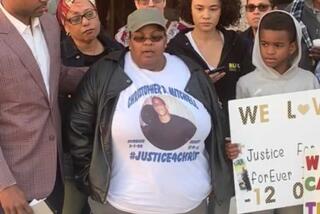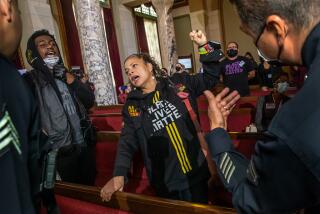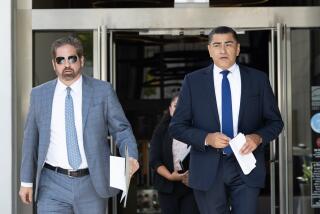Court Upholds Search in Pipe Bombings That Killed 2 LAPD Officers
- Share via
Dealing a blow to defense lawyers, a Los Angeles municipal judge Thursday refused to declare illegal the search of a North Hollywood home in which a pipe bomb explosion killed two top Los Angeles police explosives experts early this year.
Attorneys for Donald Lee Morse, 37, who was charged with the Feb. 8 murders of Detectives Arleigh McCree and Ronald Ball, had argued that the search was illegal because the judge who issued the warrant had been given incomplete information about the crime that led police to Morse’s home.
Two bombs were discovered as police searched Morse’s home for a gun they believed was used in the Feb. 4 shooting of Howard Smit, the business manager of Makeup Artists and Hairstylists Union Local 706. Smit was wounded in the shooting, which is unsolved.
Motion Denied
Municipal Judge Xenophon F. Lang denied the motion to quash the search warrant during Morse’s preliminary hearing in the downtown Criminal Courts Building. Lang gave no explanation for his ruling.
A ruling that the search was illegal would have destroyed the prosecution’s case against Morse because all evidence turned up during the search--including debris from the explosion--would have been inadmissible in court, said the prosecutor, Deputy Dist. Atty. Sterling E. Norris.
McCree, 46, commander of the police bomb squad, and Ball, 43, suffered fatal shrapnel wounds while trying to dismantle one of two pipe bombs found in the garage of Morse’s home.
Morse, a member of the Makeup Artists and Hairstylists Union, became a suspect in Smit’s shooting after police were told that Morse had been dissatisfied with the way Smit was running the union and that Morse had made threats against Smit on several occasions.
According to a Feb. 7 affidavit by Detective Philip Sowers seeking permission to search Morse’s home and van, police were seeking a gun used to shoot Smit and a ski mask that witnesses said Smit’s assailant wore. During the search, police found a gun, but it was not the weapon used to shoot Smit. Although police say Morse remains a suspect in the Smit shooting, he has never been charged.
Pierpont M. Laidley, one of Morse’s attorneys, and prosecutor Norris both refused to say why Morse might have had a pipe bomb in his garage but, in an interview, Laidley hinted that someone else might have placed the bomb in Morse’s garage. He refused to elaborate.
Seemingly contradictory evidence was presented in court Thursday by several police officers and criminalists who testified to finding explosive powder, batteries, tape, pipe and electrical wires and other materials used to make bombs in Morse’s garage, as well as the “Anarchist’s Cookbook,” a book that describes how to make explosives. Morse’s fingerprints were on the book and several other items, said Peggy Fiderio, a police fingerprints expert.
Different Description
In seeking to overturn the search as illegal, Laidley argued that Detective Sowers failed to tell the judge who issued the warrant that at least one witness to the shooting had described Smit’s assailant as Hispanic. Morse is black. Additionally, Laidley argued that the shooting could have been aimed at another union official who was with Smit at the time of the shooting.
Morse, who also faces two counts of possessing explosives, is being held without bail in County Jail. If convicted of the murder charges, he could receive the death penalty or life in prison without possibility of parole because prosecutors also filed two special circumstances allegations against Morse--multiple murders and murder by explosives.
Norris said prosecutors do not have to prove that Morse planned to kill the officers but only that, by possessing a bomb, he had intended to kill or injure someone.
More to Read
Sign up for Essential California
The most important California stories and recommendations in your inbox every morning.
You may occasionally receive promotional content from the Los Angeles Times.










